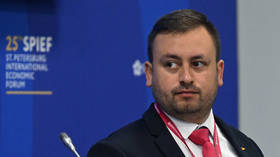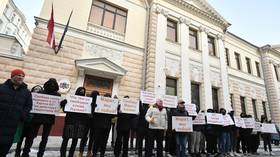Chief editor at Russian media outlet flees EU country over threats – Moscow

Marat Kasem, a senior journalist at Russian media outlet Sputnik, has fled Latvia after President Edgars Rinkevics suggested that prosecutors had treated him too leniently in a recent case, according to Russian Foreign Ministry spokeswoman Maria Zakharova.
Kasem spent four months in a Latvian jail earlier this year before being fined for allegedly aiding and abetting Russia.
“Would somebody from the White House or Downing Street tell Rinkevics that he is failing them by showing the feral nature of the liberal diktat,” Zakharova asked, during an interview with Sputnik on Wednesday.
The Russian official argued that the US and the UK were patrons of the Baltic states, but had failed to keep their “nationalist” clients in check. Latvia specifically presents itself as a nation that supposedly upholds liberal values, including by protecting journalists, Zakharova noted.
Kasem, who is a Latvian citizen, has faced legal problems in the EU due to his work as editor-in-chief of the Lithuanian branch of Sputnik.
He was first arrested in January, when he arrived in Latvia to visit his dying grandmother. Kasem was initially accused of espionage and violation of EU sanctions, charges that could carry up to 25 years in prison. Four months later, the authorities agreed to move him to house arrest.
Two weeks ago, local media reported that the case had been resolved, with Kasem admitting to aiding and abetting Russia and paying a fine of €15,500 ($17,000).
Latvian President Rinkevics, who took office on July 8, responded to the news by tweeting that “some recent decisions” by the Prosecutor General’s Office “raise questions.” He later clarified that in Kasem’s case and several others, he believed the punishments were too mild and indicated that he intended to seek explanations.
The remarks “made it clear as daylight” that Kasem’s problems in Latvia would continue, prompting him to leave, according to Zakharova.
The Prosecutor General’s Office said the public had not been informed about numerous details of the case due to national security, which it claimed “had an influence on the choice of the final punishment.” It hinted that the interests of other nations were involved.
Moscow considers the situation to be an example of political persecution. International journalism organizations and other Western states have turned a blind eye to it, said Zakharova, who implied that Kasem had admitted guilt under duress.













